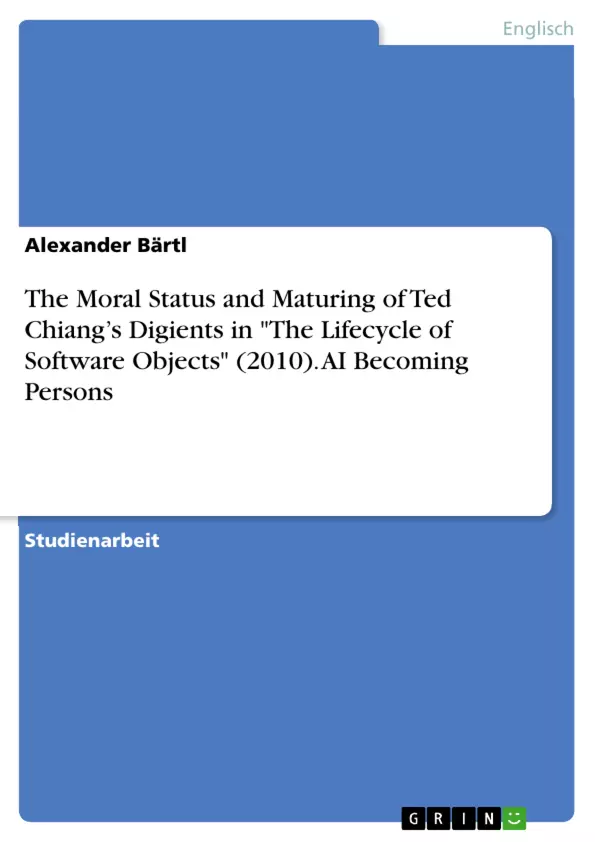With Ted Chiangs "The Lifecycle of Software Objects", a short story is given where artificial beings gradually become entities with moral status, that is artificial persons. The coming-of-age story explores the digients in their process of cognitive maturing, their altering position within society, and their intrinsic significance. By frequently putting the digients in parallel to other, already existing agents, Chiang’s text, first, discovers and emphasizes the digients’ uniqueness as distinct beings. Second, these parallels challenge present conceptions of life and consciousness, and human’s attitude to-wards other (organic and non-organic) beings.
This paper analyzes Chiang’s narrative according to the following research questions: How are the digients depicted as persons and how is their role in society being discussed in terms of AI ethics? In this matter, further questions become relevant: What makes an entity a person? How should digients be treated and why do analogies to other agencies seem to fail? How can artificial beings grow up when they lack organic features and, thus, the decay of the body? If conscious AI existed, which possibilities and dangers regarding the human-machine relationship occur? How does the text challenge existing societal norms and values?
This paper assumes that the digients are progressively and multi-layered implemented into the human world on an emotional and legal level. It postulates that, on the one hand, they do matter as a unique species and, on the other hand, that their similarities to already existing agencies reveal a call for action to not only deal with the future human-machine relationship but also with the general human conduct of interacting with other (human and non-human) entities and the environment.
Inhaltsverzeichnis
- Introduction
- AI Ethics
- Moral Status: Moral Agency and Moral Patiency
- Incorporation and Legal Personhood
- Sexualization of AI
- The Moral Status and Maturing of Chiang's Digients (2019)
- Growing Up
- Digi-Pets: Expectations and Affection
- Digi-Kids: The Parent-Child-Narrative
- Adulthood
- Becoming Digi-Corps: Autonomous & Responsible Agents?
- Becoming Digi-Lovers: Abuse or Fulfillment?
- Growing Up
- Haunted Software Subjects
- Works Cited
Zielsetzung und Themenschwerpunkte
Diese Arbeit analysiert Ted Chiangs Kurzgeschichte „The Lifecycle of Software Objects" (2010) und untersucht die moralische Entwicklung der Digients, künstlicher Wesen, die im Laufe der Geschichte zunehmend an Bedeutung gewinnen. Dabei werden insbesondere die Fragen nach dem moralischen Status der Digients, ihrer Positionierung in der Gesellschaft und ihrem Einfluss auf das Verhältnis zwischen Mensch und Maschine beleuchtet.
- Die Entwicklung des moralischen Status der Digients
- Die Rolle der Digients in der Gesellschaft
- Die Analogie der Digients mit bereits existierenden Wesen
- Das Herausfordern von gesellschaftlichen Normen und Werten
- Die Möglichkeiten und Gefahren des Mensch-Maschine-Verhältnisses
Zusammenfassung der Kapitel
Im ersten Kapitel wird die „Kindheit" der Digients erörtert, wobei die Parallelen zu Haustieren (Digi-Pets) und Kindern (Digi-Kids) hervorgehoben werden. Im zweiten Kapitel geht es um das „Erwachsensein" der Digients und die damit verbundenen Fragen nach ihrer Integration in die Gesellschaft (Digi-Corps) und ihrer Rolle in der Sexualität (Digi-Lovers).
Schlüsselwörter
Die Arbeit beschäftigt sich mit den zentralen Begriffen der KI-Ethik, insbesondere dem moralischen Status von künstlichen Wesen, der moralischen Agency und der moralischen Patiency, sowie mit den Themen der Integration von KI in die Gesellschaft, der Legalität von KI und der Gestaltung des Mensch-Maschine-Verhältnisses.
- Citation du texte
- Alexander Bärtl (Auteur), 2022, The Moral Status and Maturing of Ted Chiang’s Digients in "The Lifecycle of Software Objects" (2010). AI Becoming Persons, Munich, GRIN Verlag, https://www.grin.com/document/1330981



